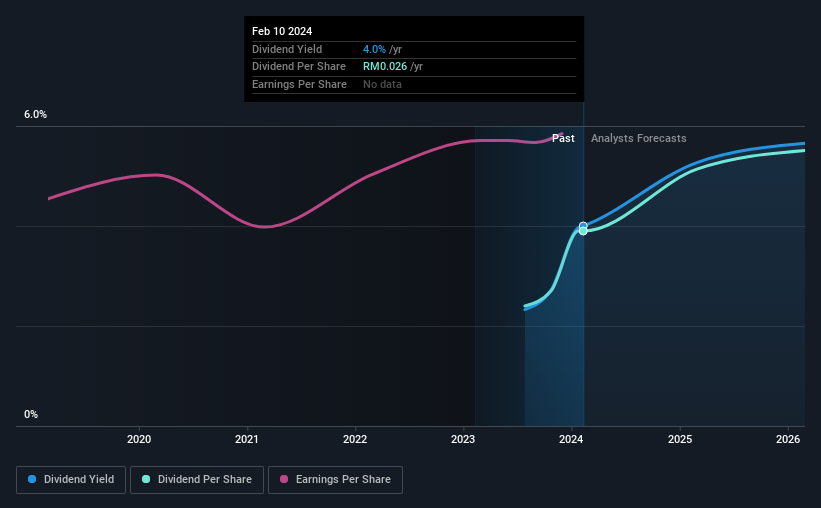Three Days Left Until DXN Holdings Bhd. (KLSE:DXN) Trades Ex-Dividend
It looks like DXN Holdings Bhd. (KLSE:DXN) is about to go ex-dividend in the next 3 days. The ex-dividend date is usually set to be one business day before the record date which is the cut-off date on which you must be present on the company's books as a shareholder in order to receive the dividend. It is important to be aware of the ex-dividend date because any trade on the stock needs to have been settled on or before the record date. Thus, you can purchase DXN Holdings Bhd's shares before the 15th of February in order to receive the dividend, which the company will pay on the 8th of March.
The company's next dividend payment will be RM00.009 per share, on the back of last year when the company paid a total of RM0.018 to shareholders. Looking at the last 12 months of distributions, DXN Holdings Bhd has a trailing yield of approximately 4.0% on its current stock price of RM00.65. Dividends are an important source of income to many shareholders, but the health of the business is crucial to maintaining those dividends. As a result, readers should always check whether DXN Holdings Bhd has been able to grow its dividends, or if the dividend might be cut.
See our latest analysis for DXN Holdings Bhd
Dividends are usually paid out of company profits, so if a company pays out more than it earned then its dividend is usually at greater risk of being cut. Fortunately DXN Holdings Bhd's payout ratio is modest, at just 44% of profit. Yet cash flow is typically more important than profit for assessing dividend sustainability, so we should always check if the company generated enough cash to afford its dividend. Over the last year, it paid out more than three-quarters (80%) of its free cash flow generated, which is fairly high and may be starting to limit reinvestment in the business.
It's encouraging to see that the dividend is covered by both profit and cash flow. This generally suggests the dividend is sustainable, as long as earnings don't drop precipitously.
Click here to see the company's payout ratio, plus analyst estimates of its future dividends.
Have Earnings And Dividends Been Growing?
Companies with consistently growing earnings per share generally make the best dividend stocks, as they usually find it easier to grow dividends per share. Investors love dividends, so if earnings fall and the dividend is reduced, expect a stock to be sold off heavily at the same time. This is why it's a relief to see DXN Holdings Bhd earnings per share are up 4.9% per annum over the last five years. A payout ratio of 44% looks like a tacit signal from management that reinvestment opportunities in the business are low. In line with limited earnings growth in recent years, this is not the most appealing combination.
Given that DXN Holdings Bhd has only been paying a dividend for a year, there's not much of a past history to draw insight from.
Final Takeaway
Is DXN Holdings Bhd an attractive dividend stock, or better left on the shelf? Earnings per share growth has been modest, and it's interesting that DXN Holdings Bhd is paying out less than half of its earnings and more than half its cash flow to shareholders in the form of dividends. It might be worth researching if the company is reinvesting in growth projects that could grow earnings and dividends in the future, but for now we're not all that optimistic on its dividend prospects.
So while DXN Holdings Bhd looks good from a dividend perspective, it's always worthwhile being up to date with the risks involved in this stock. In terms of investment risks, we've identified 1 warning sign with DXN Holdings Bhd and understanding them should be part of your investment process.
If you're in the market for strong dividend payers, we recommend checking our selection of top dividend stocks.
Have feedback on this article? Concerned about the content? Get in touch with us directly. Alternatively, email editorial-team (at) simplywallst.com.
This article by Simply Wall St is general in nature. We provide commentary based on historical data and analyst forecasts only using an unbiased methodology and our articles are not intended to be financial advice. It does not constitute a recommendation to buy or sell any stock, and does not take account of your objectives, or your financial situation. We aim to bring you long-term focused analysis driven by fundamental data. Note that our analysis may not factor in the latest price-sensitive company announcements or qualitative material. Simply Wall St has no position in any stocks mentioned.

